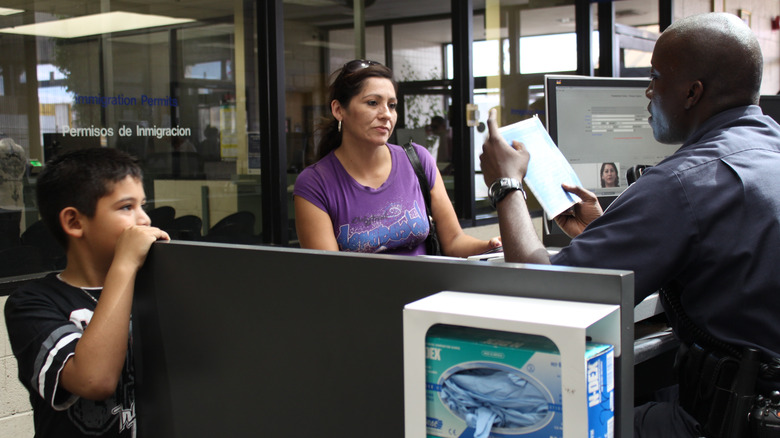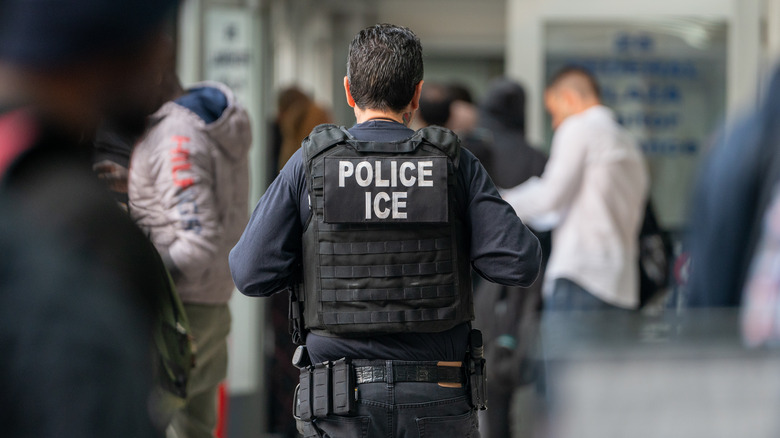Could You Get Arrested For Overstaying Your Travel Visa In The USA?
When your travel plans are bringing you to the U.S. and you hail from another country, knowing exactly what kind of travel visa you need is extremely important. Beyond the type of visa, making sure you know how long you can legally stay in the country is just as vital to avoid legal problems. Visa requirements are firmly established by the United States Customs and Border Protection, and overstaying the allotted timeframe indicated on your specific travel visa comes with some serious consequences.
The U.S. Department of State outlines all the visas available for specific travel purposes. Most visas are issued alongside an I-94 Form which explicitly states when your visa will officially expire. Travelers are expected to depart the U.S. before this listed date. Overstaying your visa means staying in the country any time beyond the date specified on this document.
In some countries, being arrested for overstaying your travel visa is a real possibility. In places like Germany, those who overstay their visa can risk being imprisoned depending on the circumstances. In the US, there are a variety of severe consequences to consider when you don't adhere to visa validity dates.
The consequences depend on how long you overstay
In reality, you likely won't end up behind bars for overstaying your visa unless you've done something illegal to constitute an arrest in addition to remaining in the country beyond your legal timeframe. However, the consequences you will face vary depending on how long you stayed past your visa expiration date. These can range from a few years of being banned from re-entering the country to a permanent ban on traveling to the U.S. altogether.
If you find yourself overstaying your U.S. travel visa for less than a year, but more than 180 days, there's a good chance you'll be banned from entering the country for three years. Those individuals who overstay their visa for a year but leave before any legal proceedings are put in place can expect to receive a 10-year travel ban to the U.S. The most extreme consequence of overstaying your travel visa is being permanently banned from entering the country in the future. This often happens to those who overstay their visa for longer than a year, are formally deported through the legal system, and try to re-enter the country.
Penalty exceptions and the possibility of ICE
Avoiding overstaying a travel visa seems simple enough. As long as you understand the expiration date and follow it, there shouldn't be a problem. That said, several situations can cause travelers to unexpectedly overstay their visas.
Some of these reasons are strictly medical. Travelers who fall ill while visiting and require urgent medical attention may end up overstaying their visas unintentionally. Natural disasters that hinder travel can also be problematic. Most recently, global health emergencies saw many visitors unable to leave the country when they originally planned.
If foreign nationals can provide documented proof of their valid reason for overstaying their travel visa in the U.S. there's a good chance penalties will be waived and they won't have to worry about a guaranteed future visa rejection. In some cases, this may include letters from treating physicians. In other cases, it may be necessary to file a special extension on a visa instead.
Ultimately, it's best to follow visa protocol. Even if prison isn't a typical penalty, there's always a chance that you can be detained by the U.S. Immigration and Customs Enforcement (ICE) if they become aware of your situation and call you in for an official meeting. Being summoned by ICE typically includes taking fingerprints, and being served with immigration documentation that could initiate deportation proceedings. Avoiding these consequences entirely starts with making sure you know upfront when you need to leave the country, and making travel plans accordingly.


